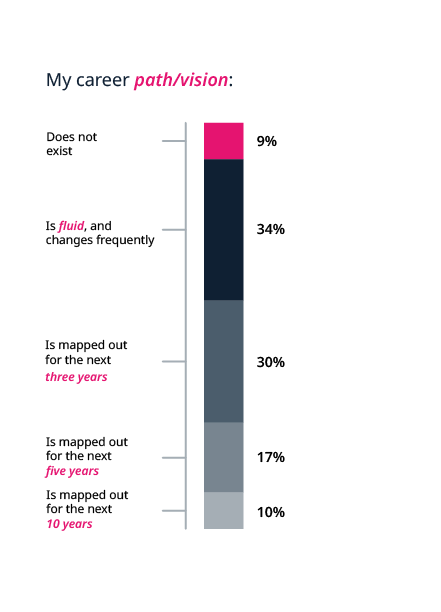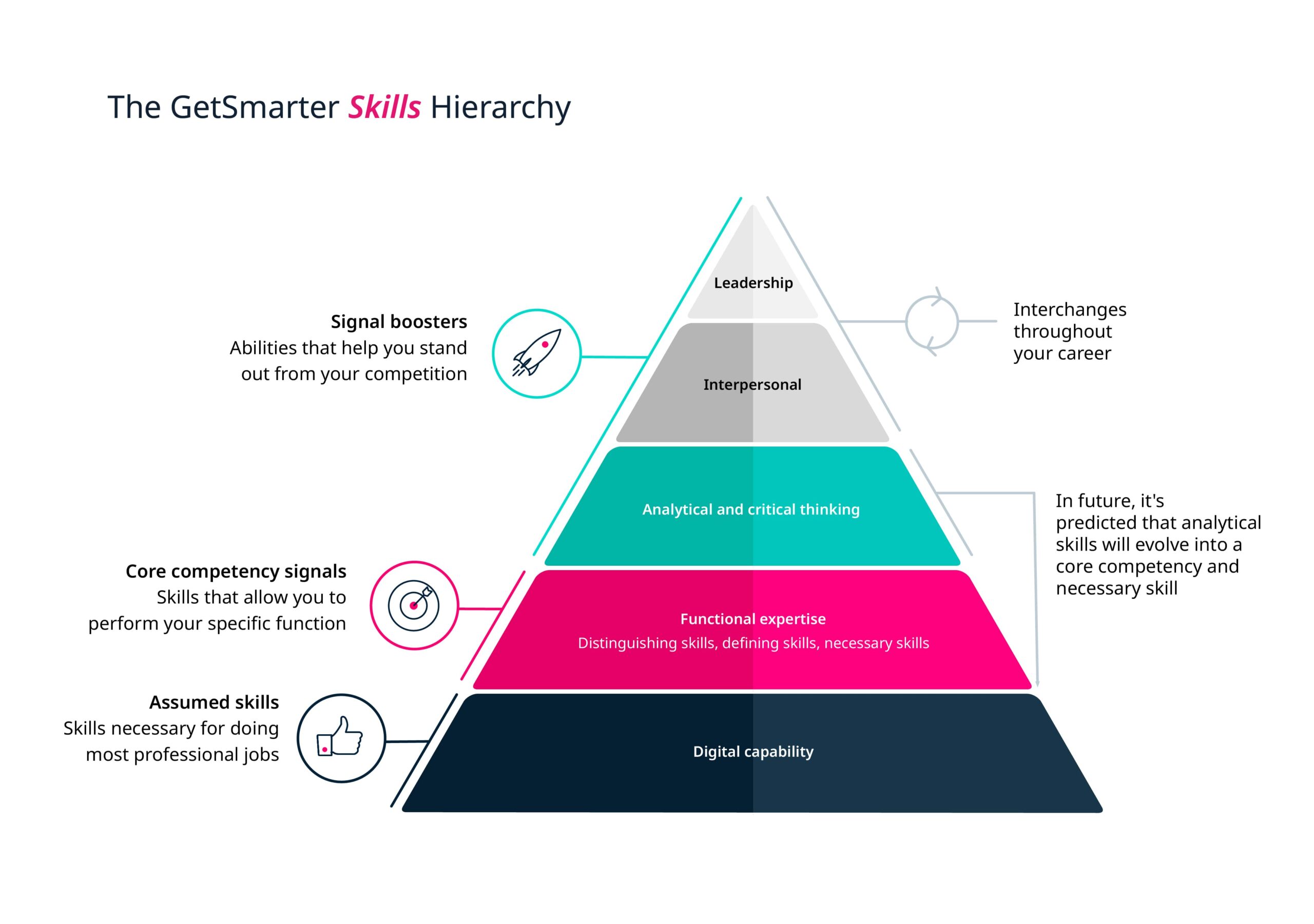The Great Career Reset: Upskilling Your Employees for an Uncertain Future
As we move into a future redefined by the dual disruptive forces of the Fourth Industrial Revolution and COVID-19, one theme repeatedly emerges loud and clear: uncertainty. Today, nearly half of the world’s CEOs consider uncertainty to be the single biggest external threat to their business.1 To succeed in the future workplace, organizations need to embrace and adapt to change, and invest in their employees’ development and well-being.
However, learning and talent development across industries has notoriously struggled to boost employee skills and adequately support their growth. In recent years, organizations have attempted to master this shortcoming through the notion of ‘learning in the flow of work’. This concept sees employees quickly and easily accessing short pieces of learning content on the job. GetSmarter’s 2020 ‘The Future of Work Is Here’ report revealed that 28% of professionals (including talent and people managers, senior leadership, and C-suite executives) consider a looming skills gap to be the key trend shaping careers over the coming years.2 And while workplaces have been able to harness a growing number of online resources to help fill this gap, simply learning in the flow of work alone isn’t enough to keep up with the rapid rate of change.3
This has been met with a groundswell of enthusiasm for more substantial skills advancement, with learning and development professionals worldwide reporting that they’re observing a stronger appetite for upskilling than ever before. 4
Respondents were also asked to complete the statement “My career path/vision is…”, where the majority (34%) selected the answer “is fluid, and changes frequently”.

This suggests a realization that employees’ career paths are no longer linear, but shift depending on their evolving needs and desires. With this in mind, organizations will need to strategically and purposefully invest in reskilling and upskilling their workforce to gain a competitive advantage and meet the needs of a rapidly changing world. To achieve this, a drastic shake-up of soft skills and, in particular, leadership skills will be needed.
In fact, according to GetSmarter’s 2020 report, critical thinking and leadership skills were viewed as being even more valuable for employees in the future than technical ability.5 Recruiters also agreed that the biggest skills gaps today lie in interpersonal skills (51%) and critical thinking (49%).6 The latest career outlook research suggests that the complexities brought on by COVID-19 have further magnified this viewpoint, with a third of respondents ranking leadership and soft skills as the most crucial focus areas for 2021.

Flexibility, fluidity, and embracing change
Businesses are moving towards fostering flexible, engaging spaces in which their employees can thrive. The disruptive impact of COVID-19 has arguably been felt most acutely in the workplace where, in a matter of months, preconceptions around the traditional nine-to-five desk job have been turned upside down. The pandemic has accelerated a new approach to careers, in which modern professionals question how, where, and when they work. Employees increasingly view the opportunity to work remotely as one of the positive outcomes of the ‘new normal’.
The advent of seamless, real-time communication has fostered a virtual, connected, and boundaryless workplace,7 where single companies increasingly rely on globally managed workpools,8 and millions appear ready to give up on the concept of fixed employers and employment altogether.9 For the business, the name of the game is flexibility and fluidity.
Fostering a culture of engagement
In an era where reskilling has become a priority concern for 80% of executives,10 businesses must invest in continuous learning and foster a workplace where their employees feel motivated to pursue personal development. GetSmarter’s research reveals that 54% of professionals view upskilling as a joint responsibility between a business and an individual, with 69% of HR managers agreeing that online courses are an effective means of enhancing marketable interpersonal skills.11 Fostering an organizational culture of learning and self-assessment not only helps close critical skills gaps, but can lower staff turnover and substantially enhance employee engagement and retention.12 And with 57% of GetSmarter’s respondents indicating that they were either “likely” or “very likely” to change jobs (i.e. leave their current company for another role within their industry) in the next 12 months, the ability to develop and retain skilled staff is more critical than ever.
The power of trust
Trust has proven vital to a company’s future success. It enables organizations to design a culture that supports their workforce, enhances business operations, and aids the community. Organizations that implement measures to ensure their employees are safe, supported, and equal will stand out in the future marketplace.
Accenture’s future workforce research discovered that by meeting six key employee needs – emotional and mental, relational, physical, financial, purposeful, and employable – organizations can unlock individual’s full potential, a framework they’ve dubbed “Net Better Off”. They found that 64% of a person’s potential is affected by how they feel across these dimensions.13 By enhancing how your workforce feels across these dimensions and creating trusting relationships, you can not only improve your team’s ability to leverage skills and strengths, but boost business performance as well.
Their research also found that few companies are embracing best practices, such as enabling continuous learning, using technology to develop flexible work environments, and promoting employee well-being and equality, which could provide positive workforce behaviors and enhance revenue growth potential.14
Towards continuous learning
Ultimately, there is a heightened drive from both employees and employers to reassert some control over the future of careers through upskilling. For the working professional, the best response to uncertainty is lifelong learning, and the organizations that create a flexible environment in which this is encouraged are most likely to succeed.
How will you prioritize employee development in 2021? GetSmarter for business can help you take ownership and control of your organization’s future by assisting you in upskilling and reskilling your workforce. Explore which future-ready skills your employees should be developing and better understand their individual worth using the Career Navigator tool.
Prepare your employees for the future workplace.
Stay competent, confident, and informed
Sign up to our monthly newsletter to receive the latest course information, expertise from renowned thought leaders, and a summary of our most recent blog articles.
- 1 Bruce, J. (Jan, 2020). ‘The future of work is now: Embrace the uncertainty’. Retrieved from Forbes.
- 2 (Sep, 2020). ‘The future of work is here’. Retrieved from GetSmarter.
- 3 Daniel, M. (Aug, 2020). ‘We can’t “flow of work” our way into the future’. Retrieved from CIO.
- 4 (2020). ‘Leading with learning: Insights and advice about the new state of L&D’. Retrieved from LinkedIn Learning.
- 5 (Sep, 2020). ‘The future of work is here’. Retrieved from GetSmarter.
- 6 (Sep, 2020). ‘Future of work: 8 megatrends shaping change’. Retrieved from GetSmarter.
- 7 Altman, S and Bastian, P. (2019). ‘DHL Global Connectedness Index’. Retrieved from DHL.
- 8 (2020). ‘2020 Global Talent Trends Study’. Retrieved from Mercer.
- 9 Grant, A. (Jun, 2020). ‘Adam Grant on how jobs, bosses and firms may improve after the crisis’. Retrieved from The Economist.
- 10 Avrane-Chopard, J. et al. (Nov, 2019). ‘How to develop soft skills’. Retrieved from McKinsey.
- 11 (Sep, 2020). ‘The future of work is here’. Retrieved from GetSmarter.
- 12 (Sep, 2020). ‘The future of work is here’. Retrieved from GetSmarter.
- 13 (Sep, 2020). ‘Care to do better’. Retrieved from Accenture.
- 14 (Sep, 2020). ‘Care to do better’. Retrieved from Accenture.